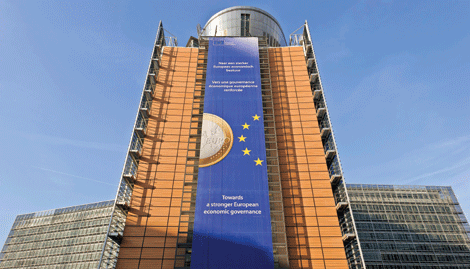Eurozone economic confidence declines to lowest in two years as crisis deepens
Updated: 2011-11-30 07:57
(China Daily)
|
|||||||||
|
|
ZURICH - European confidence in the economic outlook dropped to the lowest in two years in November, as the 17-nation eurozone edged closer to a recession and the fiscal crisis started to hit larger countries.
An index of executive and consumer sentiment in the eurozone fell to 93.7 from 94.8 in October, the European Commission in Brussels said on Tuesday. That's the lowest since November 2009.
Eurozone finance chiefs are under increasing pressure to step up their crisis response as the two-year sovereign debt crisis spreads from the periphery to core countries, clouding growth prospects. Services and manufacturing contracted in November and the European Central Bank this month trimmed borrowing costs.
"Tighter fiscal policy, squeezed consumer purchasing power, the heightened eurozone sovereign debt crisis, weaker global growth and financial market turmoil are taking a major toll on economic activity," said Howard Archer, chief eurozone economist at IHS Global Insight in London. "The ECB really should be cutting interest rates again."
Main threat
The Organization for Economic Cooperation and Development in Paris on Monday lowered its global growth forecast for this year and next, calling Europe's fiscal crisis the main threat. The economy of the 34 OECD nations will expand 1.9 percent this year and 1.6 percent the next, instead of a previously projected 2.3 percent this year and 2.8 percent the next, it said.
The eurozone is already in a "mild recession", with GDP expanding just 0.2 percent in 2012, the OECD said. In 2013, the economy may expand 1.4 percent.
"The euro-area crisis represents the key risk to the world economy," the OECD said. "Contagion has entered a new phase and spread beyond euro-area countries normally seen as fiscally vulnerable, suggesting that fiscal concerns are no longer the only driving force behind contagion."
A gauge of sentiment among European manufacturers dropped to minus 7.3 from minus 6.5 in October, Tuesday's report showed. An indicator of services confidence fell to minus 1.7 from 0.1 in the previous month, while a measure of consumer confidence decreased to minus 20.4 from minus 19.9.
Slowing demand
Siemens AG, Europe's largest engineering company, on Nov 10 forecast that profit next year won't advance on "moderate" sales growth. The Munich-based company joined rivals including France's Schneider Electric SA in bracing for a slowdown in spending on infrastructure as cash-strapped governments toughen austerity measures to counter the fiscal crisis.
"We are currently seeing the first indications of a slowdown in demand in the European markets," Juergen Geissinger, chief executive officer of Schaeffler AG, the roller-bearing maker that controls Continental AG, said on Nov 22. "On a global basis, our orders in hand remain solid."
European companies are already cutting spending and eliminating jobs. Eurozone unemployment increased in September, pushing the jobless rate to 10.2 percent. The eurozone's economic growth stalled in the third quarter from the previous three months; the economies of Portugal and the Netherlands shrank.
A gauge of eurozone manufacturers' output expectations dropped to minus 0.7 from 0.2 in the previous month, Tuesday's report showed. An indicator of order books slumped to minus 14, while a gauge of employment expectations declined to minus 3.
'Rapid escalation'
Fiat SpA CEO Sergio Marchionne said on Nov 21 that the outlook for profitability in Europe is uncertain. The Italy-based carmaker is "to some degree cautious on what is possible from Europe next year", he said.
Moody's Investors Service said on Monday that the "rapid escalation" of the fiscal crisis threatens all of the region's sovereign ratings. Credit risks will keep increasing without steps to stabilize markets in the short term, it said.
Spain last week dropped plans to sell three-year bonds, Italy paid more to borrow for two years than for 10, Standard & Poor's trimmed Belgium's credit rating and Portugal's was cut by Fitch Ratings below investment grade.
Nobel Prize winner Joseph Stiglitz said on Nov 23 that European efforts are "just too little and too late".
"There's a significant likelihood that Europe will be facing a recession, there are already signs of economic downturn," he said. "European leaders say they're committed to preserving the euro, but they're reluctant to do what's necessary."
Bloomberg News












